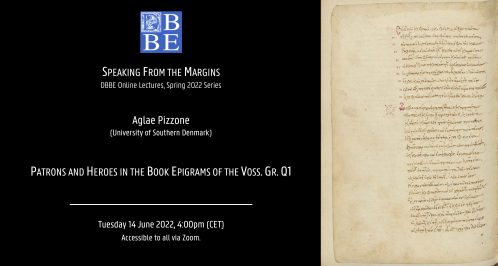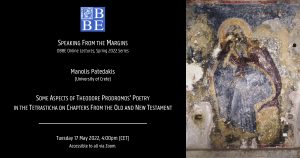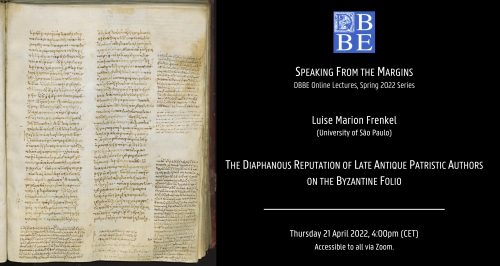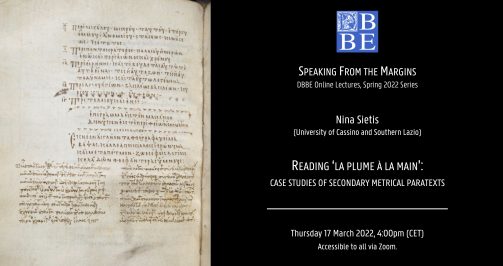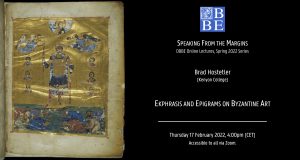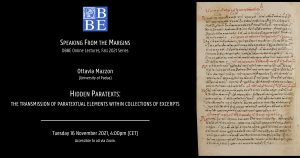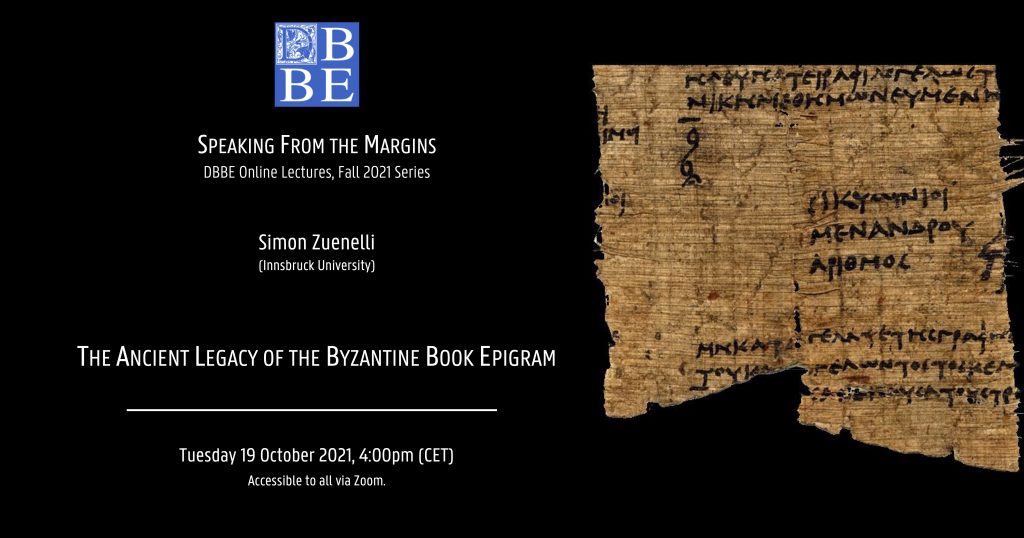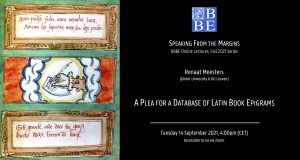The last lecture in the online lecture series Speaking From the Margins. DBBE Online Lectures, Spring 2022 Series will be given by Aglae Pizzone (University of Southern Denmark).
Aglae Pizzone is a byzantinist with a training in classics. In her research she focuses on cultural history and history of the ideas. She is currently associate professor in Medieval Literature at the Danish Institute for Advanced Study, hosted by the University of Southern Denmark. She is interested in autography, self-commentaries in the Greek Middle Ages as well as in the Byzantine commentaries on Hermogenes. She has recently discovered new autograph notes by John Tzetzes in the Voss. Gr. Q1. She is PI in the MSCA Doctoral Network AntCom. From Antiquity to community: rethinking classical heritage through citizens humanities (2023-2027). Recent publications include Self-authorization and Strategies of Autography in John Tzetzes, Greek roman and Byzantine Studies, 60.4 (2020) 652-690; ‘Tzetzes and the prokatastasis: a tale of people, manuscripts, and performances’, in Prodi E. (ed.), ΤΖΕΤΖΙΚΑΙ ΕΡΕΥΝΑΙ. Bologna: Eikasmos, 2022, 49-104; and the volume, co-edited with Douglas Cairns, Martin Hinterberger and Matteo Zaccarini, Emotions through Time: From Greece to Byzantium. Heidelberg: Mohr Siebeck, 2022.
Abstract
Before the composition of the Histories, Tzetzes’ commentary on Aphthonios and Hermogenes in political verse, with its scope and sheer extension, was certainly meant to be the most representative among his mature work. It is therefore no surprise that the Vossianus Gr. Q1, a contemporary, “bespoke” witness of the commentary, is equipped with a series of metrical and prose paratexts providing details on the genesis of this specific copy. They are to be found at fol. 30r, after the end of the commentary on Aphthonios (6 hexameters), and at fols. 111v–112r after the end of the commentary on the four Hermogenian treatises and before the section of the Logismoi preserved by the manuscript (respectively 10 hexameters and 24 dodecasyllables). At fol. 112r there is also a prose note, detailing the problems encountered by Tzetzes after handing over the requested copy to its commissioners. The longer hexametric poem provides us with information about the commissioner, one Nikephoros who might be the mystikos Nikephoros Serblias mentioned in the letter-collection. It also describes Tzetzes in dialogue with the Muse, whom he persuades to dwell in the “lower regions” of poetry in political verse. The talk will walk the audience through these paratexts, illustrating their function both within the specific textual organization of the Vossianus Gr. Q1 and more broadly against Tzetzes’ poetics.
Practical information
Date & time: Tuesday 14 June 2022, 4:00pm (CET)
No registration required. The lecture is freely accessible via Zoom: https://ugent-be.zoom.us/j/92420884710?pwd=aFprM2FpamdEN0ZKK2c3ZTJSQkZMQT09.
- Meeting ID: 924 2088 4710
- Passcode: r7BFw3Bv
N.B.: A Zoom account is required to join this meeting. Please make sure to be logged in, using your Zoom credentials.
